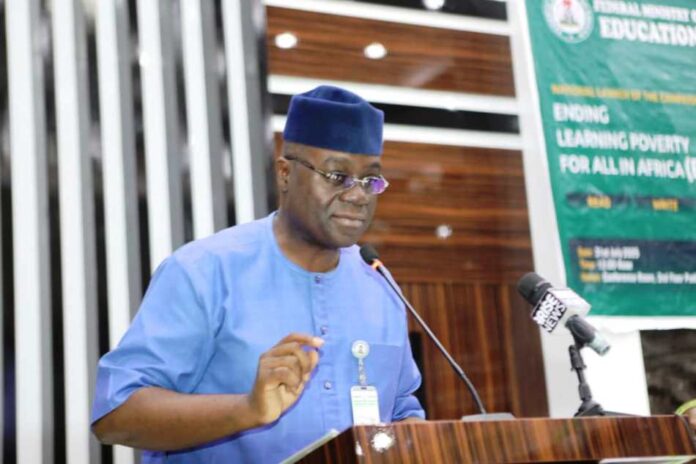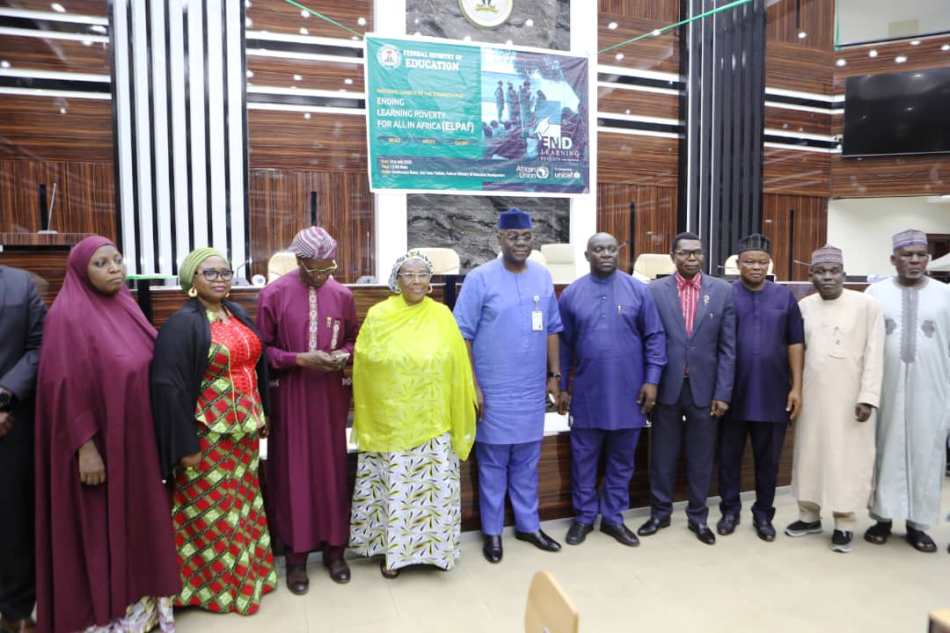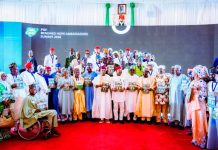In a bold step towards tackling the foundational learning crisis across the continent, the Federal Government of Nigeria has officially launched the Ending Learning Poverty for All in Africa (ELPAF) campaign, an ambitious African Union (AU)-led initiative aimed at ensuring that every child acquires the basic literacy and numeracy skills essential for lifelong learning and sustainable development.
The launch, held in Abuja, was presided over by the Honourable Minister of State for Education, Professor Suwaiba Sa’id Ahmad, who was represented by the Permanent Secretary of the Federal Ministry of Education, Mr. Abel Olumiyiwa Enitan. In her address, the Minister described the campaign as a defining call to action.
“We are here not only to commemorate the launch of another important umbrella initiative but to commit ourselves to a transformative journey that aligns foundational learning with the demands of our time,” she stated. Professor Ahmad referenced the World Bank’s 2019 definition of learning poverty—the inability of a 10-year-old to read and understand a simple sentence—and described the current statistics in sub-Saharan Africa as “staggering and sobering,” with more than 80% of children affected. She lamented that despite being enrolled in school, many children are not truly learning, calling this crisis “the silent erosion of human potential,” which perpetuates cycles of poverty, inequality, and social instability. To reverse this trend, she stressed the need for urgent, coordinated, and cross-sectoral action across the continent, reaffirming the Tinubu administration’s commitment to foundational learning under the Renewed Hope Agenda, which places education at the core of Nigeria’s national priorities.
Highlighting Nigeria’s ongoing efforts, the Minister listed key programmes such as the National Foundational Literacy and Numeracy Programme, the Nigeria Learning Passport—a digital platform providing accessible learning materials, the Accelerated Basic Education Programme for out-of-school children, and continuing reforms in teacher education and professional development aimed at improving instructional quality nationwide. “The ELPAF campaign presents a strategic opportunity for African countries to align their educational interventions, strengthen financing mechanisms, prioritize foundational learning, and address poverty where it begins—in classrooms, rural communities, and displacement camps,” she added. She also urged African governments to prioritize education at the highest political levels and called on young people to serve as ambassadors for the campaign, emphasizing that “learning is not a privilege for a few, but a right for all.”
Delivering the welcome address, Hajia Larai Nana Ahmed, Director of Education Support Services, gave a snapshot of Nigeria’s foundational learning challenges. She cited persistent issues such as overcrowded classrooms, inadequate infrastructure, and language barriers, but highlighted the government’s response through initiatives such as the Home-Grown School Feeding Programme, inclusive education strategies, teacher training workshops, and the Nigeria Education Sector Renewal Initiatives (NESRI).
Dr. Omolara Loudoun, Assistant Director of Bilateral, Commonwealth, and African Affairs, highlighted Nigeria’s selection as one of the first 25 African countries participating in the pilot phase of the ELPAF campaign. She described the initiative as a pivotal moment in tackling entrenched issues of inequality, governance, and systemic inefficiencies, calling ELPAF a “roadmap for measurable transformation.” She praised the African Union and its development partners for their leadership and urged education leaders in Nigeria to take active roles in driving the campaign’s implementation.
Speaking on behalf of the African Union, Dr. Mahaman Bachir reaffirmed the AU’s deep concern about the growing learning crisis on the continent and reiterated its commitment to working with national governments and international stakeholders to improve basic education delivery and eradicate learning poverty through the ELPAF campaign.
According to a recent report by UNICEF, over 70% of Nigerian children lack foundational literacy and numeracy skills and are unable to read and comprehend a simple sentence by the age of 10—a stark indicator of the learning poverty challenge that ELPAF seeks to confront head-on.
In her closing remarks, Mrs. Onoja Joy, Deputy Director of Basic Education, expressed appreciation to the Honourable Ministers and the Permanent Secretary for their continued leadership. She called on Executive Secretaries, Education Directors, and State Education Boards to drive full implementation of the campaign nationwide.
The ELPAF campaign, supported by both the African Union (AU) and the United Nations Children’s Fund (UNICEF), serves as a continental wake-up call to the critical issue of children being in school but not learning. It encourages African governments to collaborate with international development partners, donors, and education stakeholders to prioritize foundational learning, close equity gaps, and deliver inclusive, quality education for every African child.
The Federal Ministry of Education is committed to ensuring that no child in Nigeria or across the African continent is denied the right to foundational learning. Through sustained political will, strategic partnerships, and inclusive programmes like ELPAF, the Ministry will continue to champion policies and initiatives that close learning gaps, build resilient education systems, and empower children with the skills they need to succeed. As Nigeria joins hands with other African nations in this transformative campaign, it reaffirms its leadership in shaping an Africa where every child can read, write, and reach their full potential.
Signed
Boriowo Folasade
Director, Press and Public Relations






